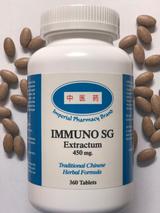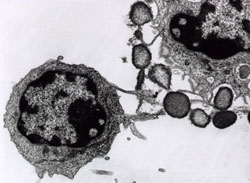What are the NK cells and why they are so important.
NK (CD56) cells are one of many interactive components of the immune system, however, they have some very special qualities. NK cells are in the T cell family and know "self" from "non-self" like other T cells. NK cells focus on killing cancer cells and virally infected cells, but will also kill bacteria, parasites and fungi. What's really special about them is that they are antigen nonspecific lymphocytes, which have the ability to attack foreign cells without first having to recognize specific antigens. They specialize in killing cancer cells and virus infected cells, which for whatever reason, become invisible to other elements of the immune system. Any cell that is "hiding" is vulnerable to attack by NK cells if they are capable enough to respond. This is a routine task for them as cancer and virus cells have a tendency to "hide". NK cells are the body’s own defense against cancer cells and viral infections. The NK functions become even more relevant when other elements of the immune system become overwhelmed so as to slow or stop their function. NK cells are the last line of defense a person has.
Decreased NK cell activity means that either the person is sick or will be. On the other hand, chronic or severe illness could indicate low NK cell activity among other compromised immune system factors. Measurement of natural killer cells activity is a very useful evaluation of the immune function status, and it has good clinical applications, especially in cancer patients.
Medical research has confirmed the correlation between low NK cell activity and cancer, viral and bacterial diseases, and autoimmune diseases. The recognizing the following:
- In general, patients with lo levels of NK cell activity and serious viral infection has been documented.
- Patient with auto immune diseases may have abnormalities in NK cell activity.
- Impaired NK cell function has been reported in patients with connective tissue diseases including lupus and rheumatoid arthritis.
- In cancer, NK cells are thought to be the first and last line of host defense against blood-borne metastases.
- Low levels of NK cells or poor KN cell activity in patients with cancer or other diseases may be associated with more severe symptoms or increased risk of disease progression.
The NK cells circulate through our body, seeking cells that have unusual molecules on their surface, which indicate that the cell is either a tumor cell, or it is infected with a virus. When such a cell is found, the NK cell opens up and extends a tentacle to the ailing cell and engages the "Killer Activating Receptor" in preparation to destroy the cell. Another tentacle reaches out to seek another spot in the cell, the "Killer Inhibitory Receptor". If this spot is not found, the NK cell blasts the sick cell with particles that punch holes in the bad cell wall and pumps venom into it that surges in and out of the cell until it breaks out.
This event is enacted 10,000 times a day in a healthy person's body as tumor cells are routinely destroyed when they are formed. Below shows a picture of a Natural Killer cell attacking and destroying a cancer cell (as reference from Advances in Cancer Detection “My Discovery of the Natural Killer Cell”, by Jerry T. Thornthwaite, Ph. D.).







